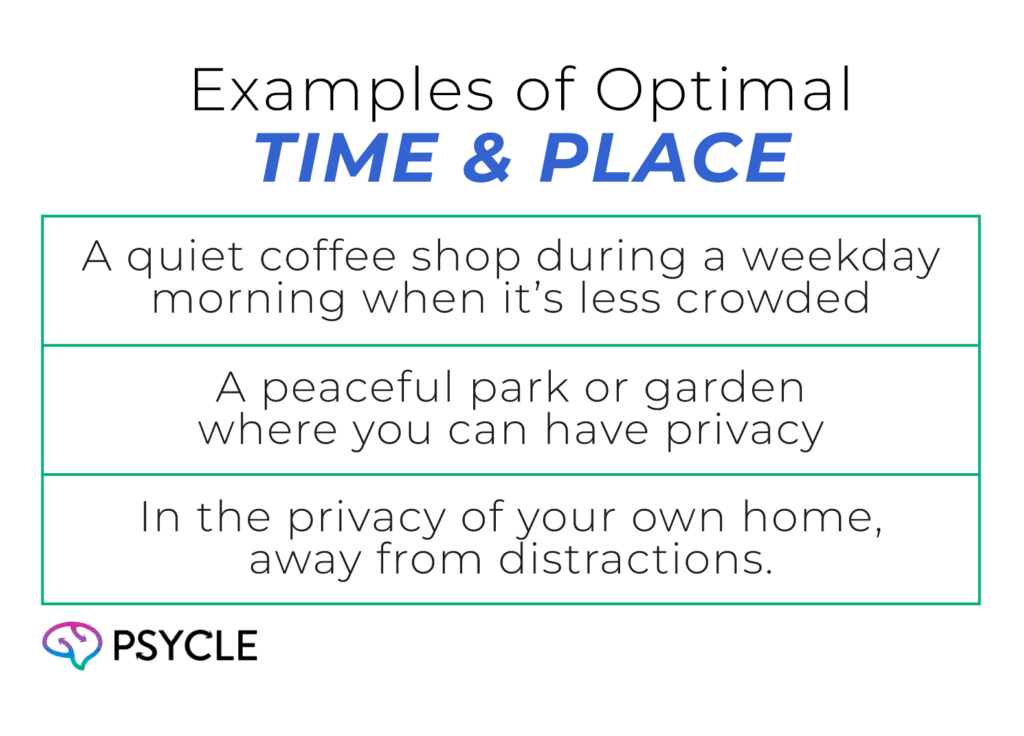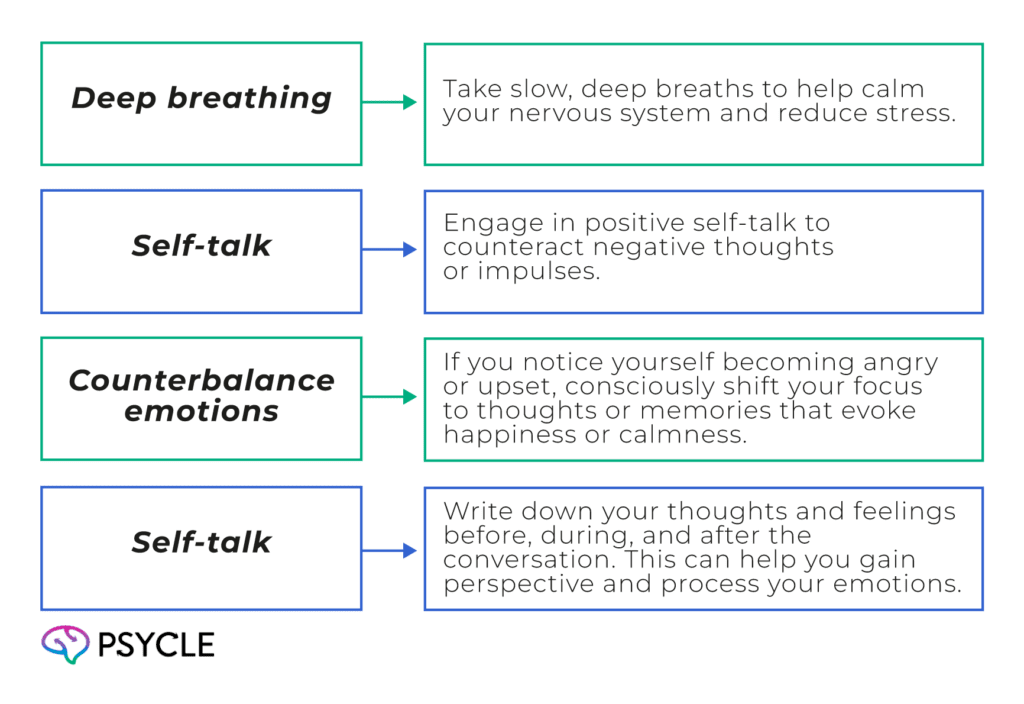Having a difficult conversation with a loved one can be challenging, but it is an essential part of maintaining healthy relationships. Open and honest communication is key whether it’s addressing a sensitive topic or resolving a conflict. In this article, we will explore effective strategies and techniques to navigate hard conversations with someone you love.
Key Takeaways
- Prepare mentally by reflecting on your feelings and desired outcomes before initiating the conversation.
- Choose the right time and place, ensuring privacy and no distractions, for a focused and uninterrupted dialogue.
- Express yourself from the heart, using “I” statements to communicate your feelings without sounding accusatory.
- Listen actively and validate their feelings, even if you disagree, to foster understanding and trust.
- Stay calm and manage your emotions to avoid escalation, taking breaks if needed to maintain composure.
Prepare Mentally: Reflect on Your Feelings and Desired Outcome
Before engaging in a difficult conversation with someone you love, it can be helpful toprepare yourself mentally. Take a moment to reflect on your own feelings about the situation and what you hope to achieve from the conversation. This reflection allows you to gain clarity and set the direction for the discussion.
Consider the range of emotions you may experience during the conversation. This can include feelings of frustration, sadness, or even anger. Acknowledging these emotions can help you feel more prepared for what might arise during the conversation.
When reflecting, it’s also important to think about your desired outcome or the resolution you hope to reach. What would be the ideal outcome for both parties involved? By identifying your desired outcome, you can approach the conversation with a clear intention, guiding the discussion towards a positive resolution.
Choose the Right Time & Place: Ensure Privacy and No Distractions
It’s essential to select a moment when both you and the other person are calm and relaxed, allowing for a more open and constructive dialogue. Avoid scheduling the conversation during periods of high stress or when either party is preoccupied with other tasks.
In addition to timing, the location plays a vital role in creating an environment conducive to productive communication. Find a quiet and private place where you can have an uninterrupted conversation. This will help ensure that both parties feel comfortable expressing themselves without fear of being overheard or interrupted.
Creating a sense of privacy fosters trust and encourages honest dialogue.
Furthermore, be mindful of eliminating distractions that could divert attention from the conversation. Put away phones or other electronic devices and turn off any distracting background noise, such as television or music.
By minimizing external stimuli, you create a focused environment that allows both parties to engage fully and concentrate on the topic at hand.

Express From the Heart: Use “I” Statements to Communicate Feelings
When engaging in a difficult conversation with someone you love, it’s crucial to express your thoughts and emotions from the heart. By using “I” statements, you take ownership of your own feelings and experiences, creating a safe space for open and honest communication.
Expressing yourself in this way helps to avoid sounding accusatory or placing blame on the other person. Instead of saying something like, “You always make me feel ignored,” try framing it as “I feel hurt and ignored when I don’t receive a response to my messages.”
This approach allows you to effectively communicate your emotions without putting the other person on the defensive. It fosters understanding and empathy, laying the foundation for a more meaningful and productive conversation.
Listen Actively: Validate Their Feelings, Even if You Disagree
During a difficult conversation, it is crucial to practice active listening and validate the other person’s feelings, even if you disagree. This approach fosters understanding and creates a safe space for open communication. By giving the person your full attention and truly hearing their perspective, you demonstrate that their feelings are important and worthy of acknowledgment.
Dismissing or interrupting their feelings can lead to further conflict and hinder the progress of the conversation. It is crucial to create an environment where the other person feels heard and valued.
By actively listening and validating their feelings, you demonstrate empathy and a willingness to understand their perspective, fostering a stronger connection.
Active listening is a communication technique used to fully understand what someone is saying and showing that back to them. It involves giving your full attention to the speaker, being present in the moment, and demonstrating that you are genuinely interested in what they are saying.
Here are some key components and tips for practicing active listening:
- Give your full attention: Focus on the speaker and avoid distractions. Maintain eye contact and eliminate any potential interruptions, such as checking your phone or looking around the room.
- Show that you are listening: Use verbal and nonverbal cues to indicate that you are engaged in the conversation. Nodding your head, making appropriate facial expressions, and providing verbal affirmations like “I see” or “I understand” can encourage the speaker to continue sharing.
- Avoid interrupting: Let the speaker express their thoughts without interrupting them. Wait for natural pauses or cues before asking questions or providing your own input.
- Paraphrase and summarize: Repeat back what the speaker has said in your own words to ensure you’ve understood correctly. Summarizing key points can demonstrate that you are actively processing the information and can help clarify any misunderstandings.
- Ask clarifying questions: If something is unclear or you need more information, ask open-ended questions to gain a deeper understanding of the speaker’s perspective. Avoid asking leading questions that may steer the conversation in a particular direction.
- Empathize and show empathy: Try to understand the speaker’s feelings and emotions by putting yourself in their shoes. Validate their experiences and emotions by acknowledging them without judgment.
- Provide feedback: Offer constructive feedback or reflections on what the speaker has shared. This can demonstrate that you are actively engaged and interested in the conversation.
Stay Calm: Manage Emotions, Avoid Escalation
In the midst of a difficult conversation, it is crucial to stay calm and composed. By managing your emotions, you can prevent the situation from escalating into a full-blown conflict. Take deep breaths and consciously keep your emotions in check.
If you feel yourself becoming overwhelmed or on the verge of losing control, it is important to take a step back. Allow yourself a break to regain composure and clarity. This break can help you approach the conversation with a calmer mindset, allowing for more effective communication.
Responding to the other person with anger or defensiveness will only exacerbate the conflict. Instead, strive to maintain a level-headed approach and respond thoughtfully. By staying calm, you can create an environment that promotes understanding and respect.
Practicing Emotional Regulation Techniques
When faced with emotionally charged conversations, it can be helpful to utilize techniques that aid in emotional regulation. Here are some strategies that can assist you in managing your emotions:

Seek Understanding: Aim for Clarity, Not Winning
When engaging in a difficult conversation with someone you love, your ultimate goal should be to seek understanding, not to win the argument. It’s crucial to shift your focus from proving your point to gaining clarity on each other’s perspectives and finding common ground. Seeking understanding allows you to empathize with the other person’s point of view and fosters a deeper connection.
Instead of getting caught up in convincing the other person that you are right, aim for clarity by actively listening, reflecting on their experiences, and acknowledging their emotions, even if you disagree. Doing so creates a safe space for open and honest communication, enabling both parties to express themselves without judgment.
Compromise
In many difficult conversations, finding a compromise is an effective way to resolve conflicts. Instead of focusing on being completely right, prioritize the health and strength of the relationship. That being said, it’s important to prioritize your values, and compromises should not conflict with your morals or affect your well-being.
Follow-Up: Revisit Conversation to Assess Changes or Progress
After having a difficult conversation, you may choose to follow up and revisit the conversation to assess any changes or progress that have occurred. This could help ensure open communication and continued growth within the relationship.
Checking in with the other person allows you to gauge their feelings and understand if there have been any positive changes since the initial conversation. It demonstrates your commitment to resolving issues and shows that you value their thoughts and emotions.
By actively engaging in follow-up discussions, you can build a stronger foundation of trust and understanding.
FAQs
How Do I Prepare Mentally for a Difficult Conversation with Someone I Love?
Before having a difficult conversation with someone you love, it is important to take the time to prepare mentally. Reflect on your own feelings about the situation and what you hope to achieve from the conversation. Consider the emotions you may experience during the conversation and how you can manage them effectively. This self-reflection will help you approach the conversation with more clarity and empathy.
How Can I Choose the Right Time and Place for a Difficult Conversation?
The timing and location of the conversation can significantly impact its outcome. Choose a time when both you and the other person are calm and relaxed. Avoid times when either of you is stressed or preoccupied with other tasks. Also, find a quiet and private place to have an uninterrupted conversation. Eliminate any distractions, such as phones or televisions, that could divert attention away from the conversation.
How Can I Express Myself Effectively During a Difficult Conversation?
When having a difficult conversation, expressing your thoughts and feelings from the heart is important. Use “I” statements to take responsibility for your own emotions and experiences. This allows you to communicate your feelings without sounding accusatory or placing blame. For example, instead of saying, “You always make me feel ignored,” say, “I feel hurt and ignored when I don’t receive a response to my messages.” This approach fosters open and honest communication.
Why is Active Listening Important During a Difficult Conversation?
Active listening is crucial during a difficult conversation. Give the other person your full attention and truly hear their perspective, even if you disagree. Validating their feelings, acknowledging their point of view, and showing empathy can help build trust and create a safe space for open communication. Avoid interrupting or dismissing their feelings, as this can lead to further conflict.
How Can I Stay Calm During a Difficult Conversation?
Staying calm during a difficult conversation is essential to prevent the situation from escalating. Take deep breaths and try to keep your emotions in check. If you feel overwhelmed, take a break and resume the conversation when you are calmer. Responding with anger or defensiveness can escalate the conflict and hinder productive communication.

